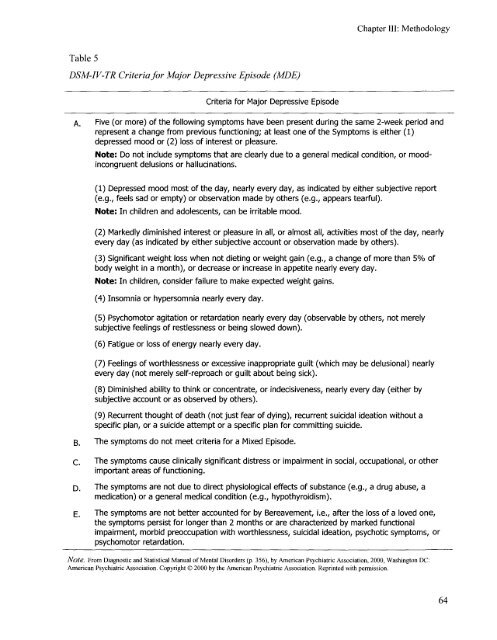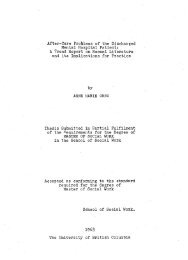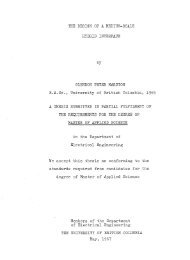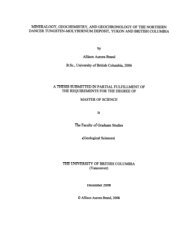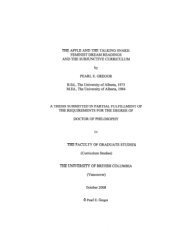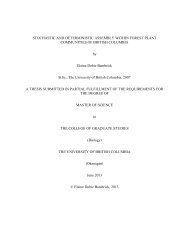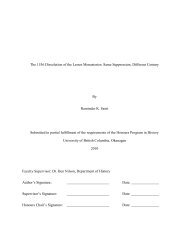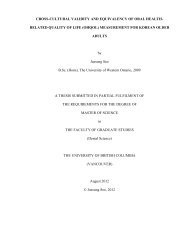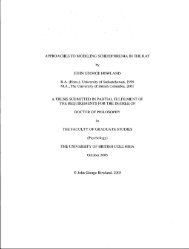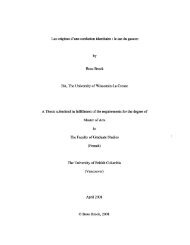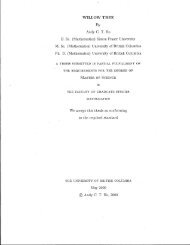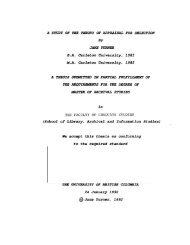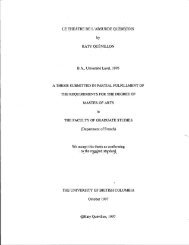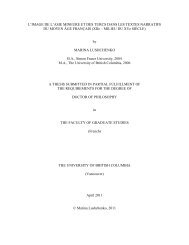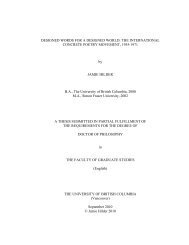how do adolescents define depression? - cIRcle - University of ...
how do adolescents define depression? - cIRcle - University of ...
how do adolescents define depression? - cIRcle - University of ...
Create successful ePaper yourself
Turn your PDF publications into a flip-book with our unique Google optimized e-Paper software.
Table 5<br />
DSM-IV-TR Criteria for Major Depressive Episode (MDE)<br />
Criteria for Major Depressive Episode<br />
Chapter III: Metho<strong>do</strong>logy<br />
A. ^ Five (or more) <strong>of</strong> the following symptoms have been present during the same 2-week period and<br />
represent a change from previous functioning; at least one <strong>of</strong> the Symptoms is either (1)<br />
depressed mood or (2) loss <strong>of</strong> interest or pleasure.<br />
Note: Do not include symptoms that are clearly due to a general medical condition, or moodincongruent<br />
delusions or hallucinations.<br />
(1) Depressed mood most <strong>of</strong> the day, nearly every day, as indicated by either subjective report<br />
(e.g., feels sad or empty) or observation made by others (e.g., appears tearful).<br />
Note: In children and a<strong>do</strong>lescents, can be irritable mood.<br />
(2) Markedly diminished interest or pleasure in all, or almost all, activities most <strong>of</strong> the day, nearly<br />
every day (as indicated by either subjective account or observation made by others).<br />
(3) Significant weight loss when not dieting or weight gain (e.g., a change <strong>of</strong> more than 5% <strong>of</strong><br />
body weight in a month), or decrease or increase in appetite nearly every day.<br />
Note: In children, consider failure to make expected weight gains.<br />
(4) Insomnia or hypersomnia nearly every day.<br />
(5) Psychomotor agitation or retardation nearly every day (observable by others, not merely<br />
subjective feelings <strong>of</strong> restlessness or being slowed <strong>do</strong>wn).<br />
(6) Fatigue or loss <strong>of</strong> energy nearly every day.<br />
(7) Feelings <strong>of</strong> worthlessness or excessive inappropriate guilt (which may be delusional) nearly<br />
every day (not merely self-reproach or guilt about being sick).<br />
(8) Diminished ability to think or concentrate, or indecisiveness, nearly every day (either by<br />
subjective account or as observed by others).<br />
(9) Recurrent thought <strong>of</strong> death (not just fear <strong>of</strong> dying), recurrent suicidal ideation without a<br />
specific plan, or a suicide attempt or a specific plan for committing suicide.<br />
B. ^ The symptoms <strong>do</strong> not meet criteria for a Mixed Episode.<br />
C.<br />
D.<br />
The symptoms cause clinically significant distress or impairment in social, occupational, or other<br />
important areas <strong>of</strong> functioning.<br />
The symptoms are not due to direct physiological effects <strong>of</strong> substance (e.g., a drug abuse, a<br />
medication) or a general medical condition (e.g., hypothyroidism).<br />
E. ^ The symptoms are not better accounted for by Bereavement, i.e., after the loss <strong>of</strong> a loved one,<br />
the symptoms persist for longer than 2 months or are characterized by marked functional<br />
impairment, morbid preoccupation with worthlessness, suicidal ideation, psychotic symptoms, or<br />
psychomotor retardation.<br />
Note. From Diagnostic and Statistical Manual <strong>of</strong> Mental Disorders (p. 356), by American Psychiatric Association, 2000, Washington DC:<br />
American Psychiatric Association. Copyright © 2000 by the American Psychiatric Association. Reprinted with permission.<br />
64


